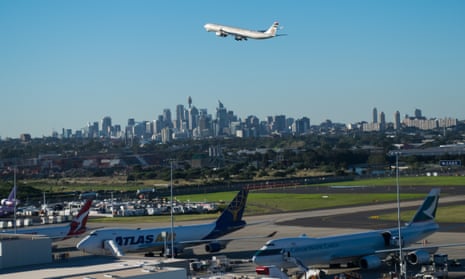Airlines will face penalties if they decide to cancel flights at Sydney airport without valid reasons, and could lose their takeoff and landing slots, as the government aims to helping smaller airlines better compete out of Australia’s largest airport.
The federal transport minister, Catherine King, on Wednesday revealed proposed changes to the legislation governing Sydney airport, responding to concerns about alleged misuse of airport’s highly valued takeoff and landing slots.
Sydney airport is restricted to 80 takeoffs and landings per hour and an overnight curfew exists to minimise noise for residents under the flight paths.
The government will crack down on airlines strategically cancelling their flights – but hanging on to valuable slots – by significantly increasing transparency about how slots are allocated and force carriers into providing reasons for cancellations or major delays, with data published regularly.
Independent audits of slot usage will “detect and crack down on anti-competitive behaviour”, which will give travellers information about the most reliable airlines but will also allow authorities to take action.
The first audit will occur this year.
“To ensure slots are not misused, the government will modernise the compliance regime to include penalties that address anti‑competitive behaviours, along with updated and strengthened enforcement tools for the government to watch airlines more closely and take effective legal action where necessary,” King said.
“This will benefit new entrant airlines wanting to set up new services, crack down on slot misuse and create a more level playing field in slot allocation processes,” she said.
“We want to make sure that we have a strong capacity here at Sydney airport for slots to be used, not pretended to be used, and we want to check to see whether that is happening. Certainly it’s a signal to the airlines that the slots are not your property, they are the Australian traveling public’s property.”
The government’s response addresses frustrations held for several years by airlines, airports and industry leaders across aviation who accuse larger airlines such as Qantas, Jetstar and Virgin of “slot hoarding”.
Slot hoarding is where airlines schedule more flights than they intend to run, before cancelling them in a strategic manner so as not to cancel any service more than 20% of the time so they retain the slot at the expense of a competitor (known as the 80:20 rule). Weather cancellations don’t count towards an airline’s limit.
Qantas Group and Virgin have consistently denied they misuse slots. However, critics point to long-term average cancellation data, which shows up to one in 10 flights between Sydney and Melbourne is cancelled.
after newsletter promotion
Fledgling budget carrier Bonza as well as formerly regional-only carrier Rex have consistently called for better access to peak slots at Sydney airport to allow them to better establish key services across the country and more meaningfully compete with Qantas Group and Virgin’s duopoly, which controls about 90% of the domestic market.
On Wednesday, King reiterated how crucial Sydney airport was for the nation’s aviation routes, and how the new reforms should help to reduce delays and disruptions across the country.
“If Sydney airport sneezes, then the entire network does catch a cold,” King said.
Sydney airport’s chief executive, Scott Charlton, thanked the government for following through with the proposals made by the Harris review, an inquiry ordered by the previous government which was delivered in 2020 and which both the Coalition and later the Albanese government were criticised for failing to respond to.
Before Charlton took over as chief executive at the end of 2023, Sydney airport had floated the idea of tightening slot cancellation limits at Sydney airport to 95:5, but King ruled out any changes to the 80:20 rule, which is a global standard at large airports but which critics had said was not fit for purpose for the slot-constrained Sydney airport.
Qantas welcomed the announced reforms. “More transparency in the slots system is a positive step that will help clarify recent public debates on how the system works and demonstrate that claims Qantas has been hoarding slots are wrong,” the airline said in a statement. “Qantas is operating well over 90% of its allocated slots.”
The Australian Airports Association also welcomed the proposed changes as “sensible and practical”. The association’s CEO, James Goodwin, said airports across the country would benefit because of the knock-on effects of delays at Sydney.
Regional airlines will also be given priority in the slot allocation process, so they fly more at peak times to offer more services for regional residents wanting to make day trips into the city for appointments.
There won’t be any changes to Sydney airport’s 11pm-6am nightly curfew, and the cap of 80 takeoffs and landings an hour will be maintained, but a new “recovery period” will now be introduced after severe weather events or other major disruptions such as security issues to temporarily allow up to 85 movements an hour for a maximum of two hours after the disruption.
